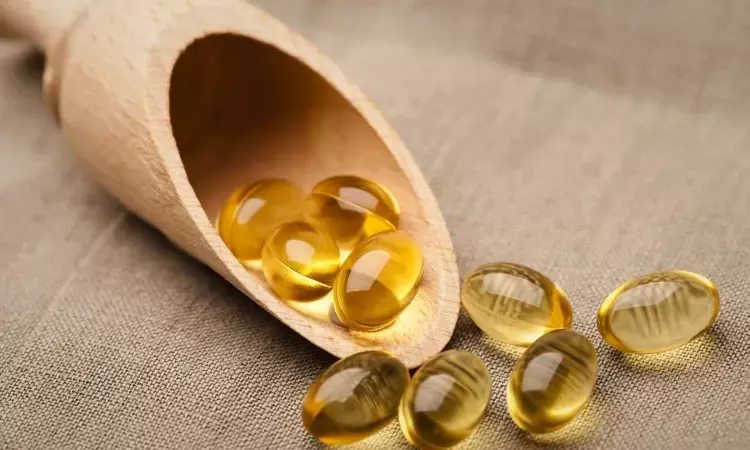- Home
- Medical news & Guidelines
- Anesthesiology
- Cardiology and CTVS
- Critical Care
- Dentistry
- Dermatology
- Diabetes and Endocrinology
- ENT
- Gastroenterology
- Medicine
- Nephrology
- Neurology
- Obstretics-Gynaecology
- Oncology
- Ophthalmology
- Orthopaedics
- Pediatrics-Neonatology
- Psychiatry
- Pulmonology
- Radiology
- Surgery
- Urology
- Laboratory Medicine
- Diet
- Nursing
- Paramedical
- Physiotherapy
- Health news
- Fact Check
- Bone Health Fact Check
- Brain Health Fact Check
- Cancer Related Fact Check
- Child Care Fact Check
- Dental and oral health fact check
- Diabetes and metabolic health fact check
- Diet and Nutrition Fact Check
- Eye and ENT Care Fact Check
- Fitness fact check
- Gut health fact check
- Heart health fact check
- Kidney health fact check
- Medical education fact check
- Men's health fact check
- Respiratory fact check
- Skin and hair care fact check
- Vaccine and Immunization fact check
- Women's health fact check
- AYUSH
- State News
- Andaman and Nicobar Islands
- Andhra Pradesh
- Arunachal Pradesh
- Assam
- Bihar
- Chandigarh
- Chattisgarh
- Dadra and Nagar Haveli
- Daman and Diu
- Delhi
- Goa
- Gujarat
- Haryana
- Himachal Pradesh
- Jammu & Kashmir
- Jharkhand
- Karnataka
- Kerala
- Ladakh
- Lakshadweep
- Madhya Pradesh
- Maharashtra
- Manipur
- Meghalaya
- Mizoram
- Nagaland
- Odisha
- Puducherry
- Punjab
- Rajasthan
- Sikkim
- Tamil Nadu
- Telangana
- Tripura
- Uttar Pradesh
- Uttrakhand
- West Bengal
- Medical Education
- Industry
Vitamin E Intake Reduces Risk of Non-Alcoholic Fatty Liver Disease:Study

Non-alcoholic fatty liver disease (NAFLD) has emerged as a prevalent chronic liver disorder with its severe manifestation which is often linked to oxidative stress. A recent study published in the Nature Scientific Reports uncovered promising evidence of the protective potential of Vitamin E against NAFLD.
This study utilized data from the National Health and Nutrition Examination Survey (2017–2020) to analyze the relationship between various forms of Vitamin E intake and the prevalence of NAFLD. The study focused on the dietary intake, supplementary use and total consumption of Vitamin E which found compelling associations with hepatic steatosis and NAFLD. This investigation included a total of 6122 participants and utilized liver ultrasound transient elastography to measure hepatic steatosis that represented as controlled attenuated parameter (CAP) scores. The diagnosis of NAFLD was based on specific CAP threshold values.
After meticulous adjustments for several covariates including demographics, lifestyle factors and medical conditions, this study unearthed significant inverse correlations between Vitamin E intake and NAFLD. The dietary Vitamin E intake demonstrated a robust protective effect against NAFLD with higher intake levels associated with reduced odds of the disease. Also, supplementary Vitamin E use expressed a notable inverse association with NAFLD prevalence, further suggesting its potential in reducing liver disease risk.
The findings also shed light on the importance of total Vitamin E intake by encompassing both dietary and supplemental forms in conferring protection against NAFLD. While the results showed a marginal improvement, it highlights the overall beneficial impact of Vitamin E on liver health. Also, the study highlighted variations in the protective effects of Vitamin E based on the presence of hyperlipidemia that suggests tailored approaches for different risk profiles.
Reference:
Qi, X., Guo, J., Li, Y., Fang, C., Lin, J., Chen, X., & Jia, J. (2024). Vitamin E intake is inversely associated with NAFLD measured by liver ultrasound transient elastography. In Scientific Reports (Vol. 14, Issue 1). Springer Science and Business Media LLC. https://doi.org/10.1038/s41598-024-52482-w
Neuroscience Masters graduate
Jacinthlyn Sylvia, a Neuroscience Master's graduate from Chennai has worked extensively in deciphering the neurobiology of cognition and motor control in aging. She also has spread-out exposure to Neurosurgery from her Bachelor’s. She is currently involved in active Neuro-Oncology research. She is an upcoming neuroscientist with a fiery passion for writing. Her news cover at Medical Dialogues feature recent discoveries and updates from the healthcare and biomedical research fields. She can be reached at editorial@medicaldialogues.in
Dr Kamal Kant Kohli-MBBS, DTCD- a chest specialist with more than 30 years of practice and a flair for writing clinical articles, Dr Kamal Kant Kohli joined Medical Dialogues as a Chief Editor of Medical News. Besides writing articles, as an editor, he proofreads and verifies all the medical content published on Medical Dialogues including those coming from journals, studies,medical conferences,guidelines etc. Email: drkohli@medicaldialogues.in. Contact no. 011-43720751


